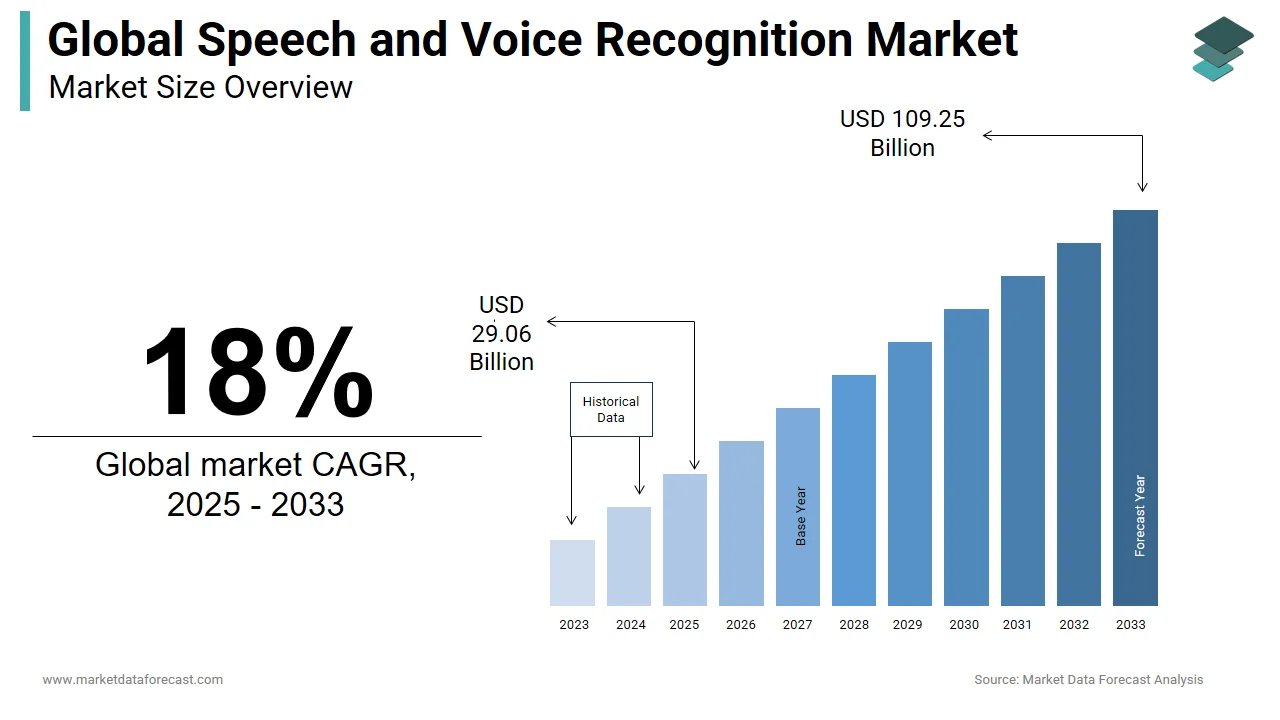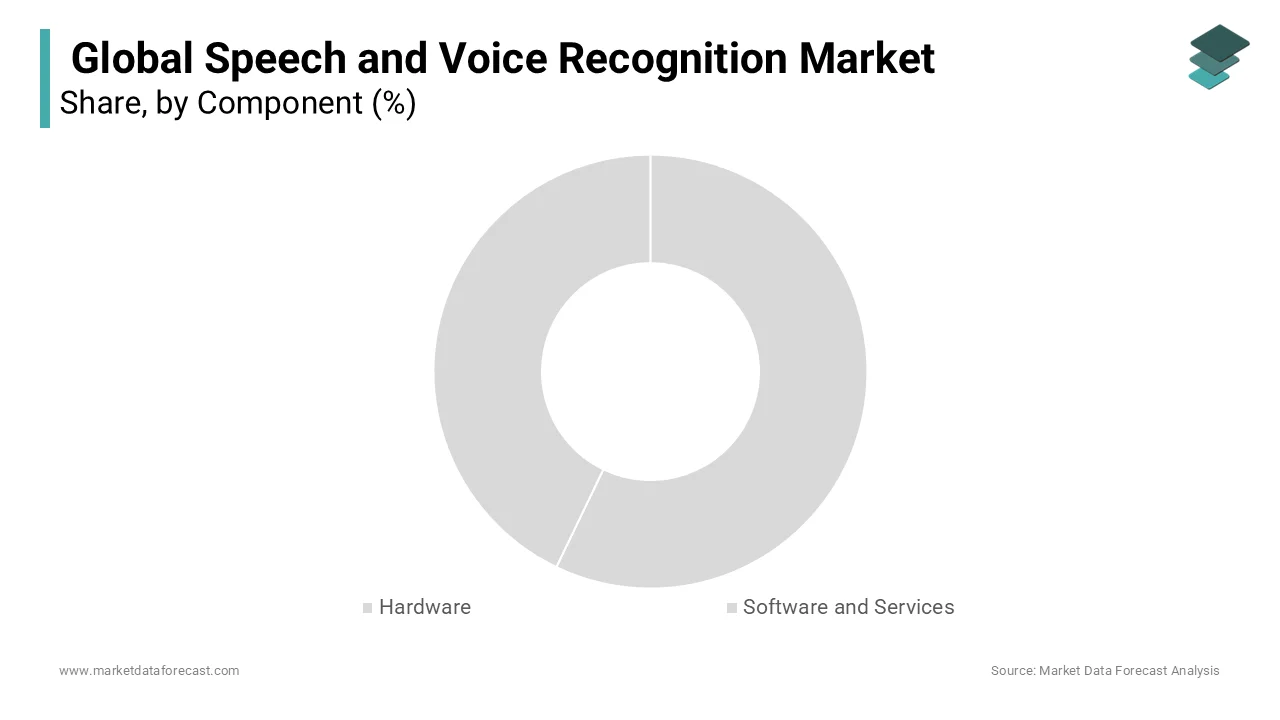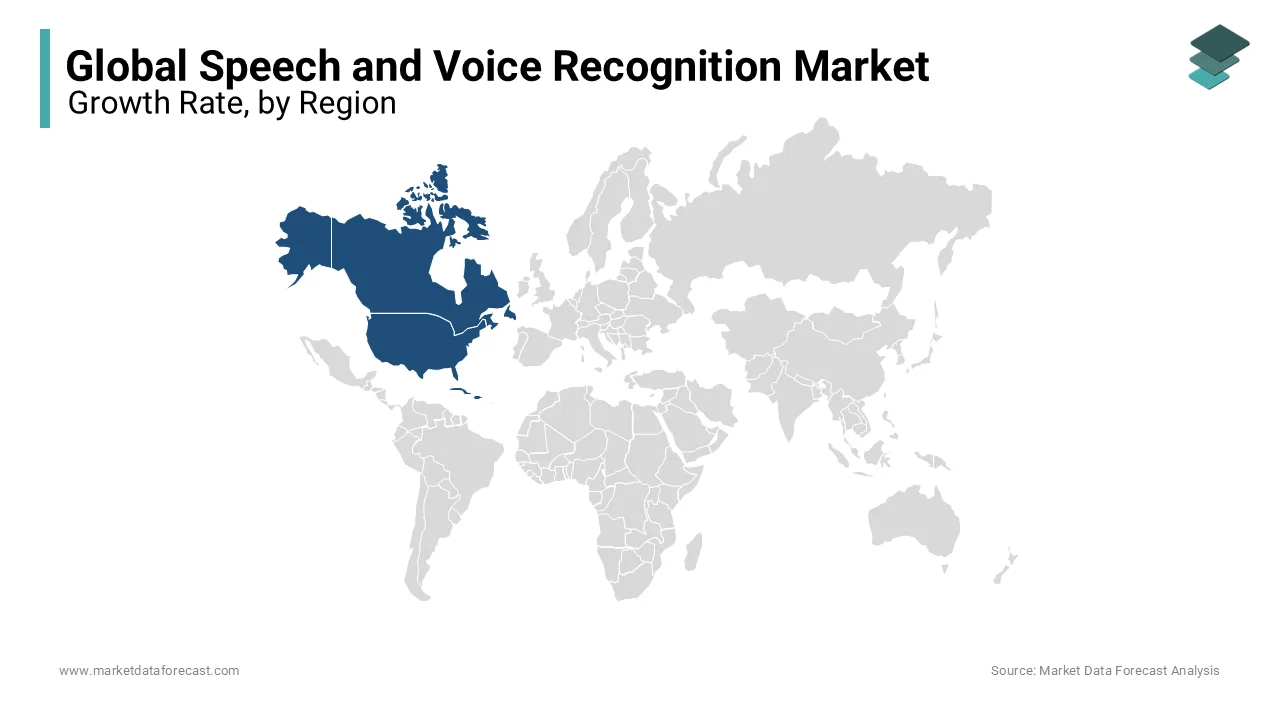Global Speech and Voice Recognition Market Size, Share, Trends, & Growth Forecast Report – Segmented By Component (Hardware, Software, and Services), Interface (AI-based and Non-AI-Based), End-User (Automotive, Government and Defense, Enterprises, Consumer Electronics, Healthcare, BFSI), Deployment (On Cloud & On-Premises), & Region - Industry Forecast From 2024 to 2032
Global Speech and Voice Recognition Market Size (2024 to 2032)
The global speech and voice recognition market was valued at USD 20.87 billion in 2023. The global market is expected to reach USD 24.63 billion in 2024 and USD 92.58 billion by 2032, growing at a CAGR of 18% during the forecast period.

Speech or voice recognition is the ability of a program to receive, interpret, and execute voice commands. These solutions are the perfect complement to voice commands between consumers and technology to obtain help with reminders and simple tasks. Voice recognition operates devices and executes commands at your fingertips without a keyboard.
Speech and voice recognition is a smaller part of biometric systems. Speech recognition refers to the process of converting spoken words into a set of modified words stored digitally using phones and microphones. The speed that measures the adequacy of the software with a human speaker and the precision that it measures the number of errors committed during the conversion of spoken words into digitized data are the two parameters that evaluate the quality of a voice recognition system. The voice recognition system analyzes the identity of the speaker behind a particular voice. Examines the sound between different speakers by studying the behavior patterns of different people, such as the tone of the person's voice, speech style, accent, and others, and also examines the shape and size of the mouth and throat of the person.
Current Scenario of the Global Speech and Voice Recognition Market
The growth of the global speech and voice recognition market can be attributed to the high growth potential of healthcare applications, the growing demand for voice authentication in mobile banking applications, the rapid proliferation of multifunctional devices or smart speakers, and the increasing impact of AI on accuracy and speech recognition.
Some speech and voice recognition applications include cars, smartphones, and smart virtual assistants like Amazon Alexa, Apple Siri, and Microsoft Cortana. Different voice recognition software solutions include a speaker-dependent solution, a speaker-independent solution, discrete voice recognition, continuous voice recognition, and natural language recognition.
MARKET RENDS
Compared to speech recognition, the voice recognition market is expected to grow at a higher rate due to the increasing use of voice recognition in multi-factor authentication systems in BFSI, Government, and defense. In North America and Western Europe, a large number of bank clients use telephone banking. Many of these financial institutions are adopting voice authentication solutions to accept or reject a user's mobile transactions. In addition, voice recognition technology is supposed to experience a high level in the public, financial, and corporate sectors in the next 2 to 3 years. Data security problems due to cyber-attacks, data breaches of hackers, and issues related to illegal immigrants are some of the main factors that contribute to the steady growth of the voice recognition market.
MARKET DRIVERS
The speech and voice recognition technique is finding maximum use in the consumer electronics industry due to the increasing number of voice and voice-activated applications on smartphones.
However, the health sector is likely to be the fastest-growing segment of the end-use industry due to the widespread use of speech and voice recognition techniques for health checks and to connect a doctor and a patient in the absence of a physical presence of the two. Speech recognition has other supporting factors, including technological advancements, the need for customer management, accelerated demand for mobility, conversion to smart homes, and a mandatory requirement to improve workforce productivity.
A growing career for solutions has also come from biometric systems for user authentication, which has spurred market growth.
There is also demand for mobile banking applications and electronic health recording (EHR) applications that support the growth of the global speech and voice recognition market. The adoption of voice assistance systems in homes and businesses has also contributed to the cause of these solutions. The factors that influenced demand were higher accuracy and precision, time management, and the reduction of human error. Emerging economies have a driving market for applications in service robots, and technological advances are factors that should provide many opportunities for growth in the years to come.
MARKET RESTRAINTS
The concerns related to hacking and data breaches are considerable obstacles to the expansion of this industry.
REPORT COVERAGE
|
REPORT METRIC |
DETAILS |
|
Market Size Available |
2023 to 2032 |
|
Base Year |
2023 |
|
Forecast Period |
2024 to 2032 |
|
CAGR |
18% |
|
Segments Covered |
By Component, Interface, End-User, Deployment, Region |
|
Various Analyses Covered |
Global, Regional, & Country Level Analysis, Segment-Level Analysis, DROC, PESTLE Analysis, Porter’s Five Forces Analysis, Competitive Landscape, Analyst Overview on Investment Opportunities |
|
Regions Covered |
North America, Europe, APAC, Latin America, Middle East & Africa |
|
Market Leaders Profiled |
Nuance (United States), Microsoft (United States), Alphabet (United States), IBM (United States), Amazon (United States), Sensory (United States), Cantab Research (United Kingdom), Iflytek (China), Baidu (China), Raytheon BBN Technologies (United States) and other market players. |
SEGMENTAL ANALYSIS
Global Speech and Voice Recognition Market Analysis By Component

The hardware segment represents the largest share in the global speech and voice recognition business.
Global Speech and Voice Recognition Market Analysis By Interface
Non-AI systems are expected to dominate the worldwide market throughout the forecast period. The AI-based segment is foreseen to grow at a very rapid rate due to technological improvements and its use in a broader range of applications.
Global Speech and Voice Recognition Market Analysis By Deployment
Based on the deployment, the cloud segment is predicted to expand with the highest growth rate with the increasing transition and benefits associated with this model.
Global Speech and Voice Recognition Market Analysis By End-User
The BFSI segment accounts for the principal portion of the global speech and voice recognition systems, attributing to the increased online purchases and need for secured transactional gateways.
REGIONAL ANALYSIS

North America's speech and voice recognition market represents the largest share due to the imperative need for customer service automation and the integration of virtual assistants with smart devices to drive market growth. The overwhelming need to streamline aspects of corporate communication that improve productivity contributes to market growth. The growing intense penetration of mobile devices and the increasing demand for voice recognition from BFSI and the healthcare sectors should support market growth over the forecast period.
KEY PLAYERS IN THE GLOBAL SPEECH AND VOICE RECOGNITION MARKET
- Nuance (United States)
- Microsoft (United States)
- Alphabet (United States)
- IBM (United States)
- Amazon (United States)
- Sensory (United States)
- Cantab Research (United Kingdom)
- Iflytek (China)
- Baidu (China)
- Raytheon BBN Technologies (United States), and others.
RECENT HAPPENINGS IN THE GLOBAL SPEECH AND VOICE RECOGNITION MARKET
-
Nuance Communications launched the universal cloud-based voice recognition platform Dragon Medical One in May 2018. It brings the power of speech directly to electrical health records (EHR), allowing Doctors to quickly and easily capture a patient's complete history at the point of care.
-
Microsoft has partnered with Toyota Motor Corporation (Japan) to activate voice recognition technology in passenger cars. The former will provide access to its superior properties, which include operating systems, voice recognition technology, AI, and gesture control.
-
Nuance and IBM have signed a licensing agreement and technical services to improve and expand innovative voice solutions designed to better serve businesses, consumers, operators, and partners. As part of this agreement, Nuance is integrating IBM technology into its voice solutions.
DETAILED SEGMENTATION OF THE GLOBAL SPEECH AND VOICE RECOGNITION MARKET INCLUDED IN THIS REPORT
This research report on the global speech and voice recognition market has been segmented and sub-segmented based on the component, interface, deployment, end-user, and region.
By Component
-
Hardware
-
Software and Services
By Interface
-
AI-Based
-
Non-AI-Based Systems
By Deployment
-
Cloud
-
On-Premises
By End-User
-
BFSI
-
Automotive
-
Healthcare
-
Consumer Electronics
-
Enterprises
-
Government and Defense
By Region
-
North America
-
The United States
-
Canada
-
Rest of North America
-
-
Europe
-
The United Kingdom
-
Spain
-
Germany
-
Italy
-
France
-
Rest of Europe
-
-
The Asia Pacific
-
India
-
Japan
-
China
-
Australia
-
Singapore
-
Malaysia
-
South Korea
-
New Zealand
-
Southeast Asia
-
-
Latin America
-
Brazil
-
Argentina
-
Mexico
-
Rest of LATAM
-
-
The Middle East and Africa
-
Saudi Arabia
-
UAE
-
Lebanon
-
Jordan
-
Cyprus
-
Frequently Asked Questions
What are the key industries leveraging speech and voice recognition technology?
Industries such as healthcare, automotive, banking and finance, retail, and telecommunications are among the key adopters of speech and voice recognition technology for applications ranging from virtual assistants to customer service automation and hands-free operation in vehicles.
How does speech and voice recognition technology impact accessibility for differently-abled individuals globally?
Speech and voice recognition technology significantly enhance accessibility for differently-abled individuals by enabling hands-free interaction with devices and applications, facilitating communication, and improving independence in daily activities.
How does the integration of speech and voice recognition technology contribute to smart home ecosystems?
Integration of speech and voice recognition technology enables seamless control of smart home devices and appliances through voice commands, enhancing convenience, energy efficiency, and overall user experience within smart home environments.
What role does artificial intelligence play in advancing speech and voice recognition capabilities globally?
Artificial intelligence plays a pivotal role in enhancing speech and voice recognition capabilities by enabling context-aware understanding, continuous learning from user interactions, and improving accuracy through neural network-based models such as deep learning. Ongoing AI research and development are driving innovations in natural language understanding and voice synthesis, further expanding the scope of applications for speech and voice recognition technology.
Related Reports
Access the study in MULTIPLE FORMATS
Purchase options starting from $ 2500
Didn’t find what you’re looking for?
TALK TO OUR ANALYST TEAM
Need something within your budget?
NO WORRIES! WE GOT YOU COVERED!
Call us on: +1 888 702 9696 (U.S Toll Free)
Write to us: [email protected]